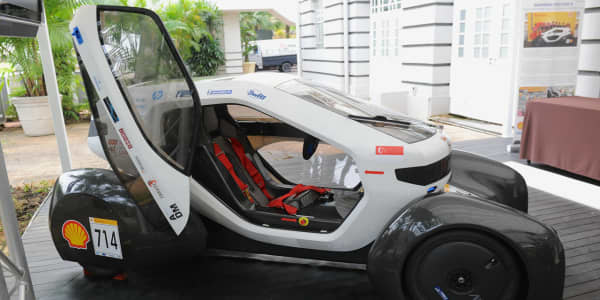
Music fans received a surprise last year when a lifelike hologram of Michael Jackson performed at the Billboard Music Awards. Now, the creators behind that technology want to bring the first digital human to healthcare.
Florida-based Pulse Evolution creates computer-generated human likeness, or 'virtual humans.' Its technology has already been featured in Hollywood blockbusters like 'The Lord of the Rings: The Two Towers,' and 'Star Wars: Revenge of the Sith.' In the education sector, Pulse is working on a recreation of Albert Einstein to teach math at the University of Beijing.
Speaking to CNBC on the sidelines of the Smart Nations Innovation conference in Singapore, managing director Rudy Mazzocchi said he intends to turn the company's focus to medicine.
"We can do a MRCP scan of your brain or heart and create a hyper-realistic holographic image of your organs and help educate physicians, train nurses, technicians, show you what's wrong with an abnormality in your heart and how the physician is going to correct it."
Personalized healthcare
The goal is to provide doctors a personalized map of a patient's body, according to Pulse. Doctors already use advanced mapping technology like positron emission tomography for that purpose, but Pulse's software will have the extra benefit of touch, Mazzocchi said.
"It's data capture, so we can take data from an MRI, do a merge with CT images, positron emission and recreate the organ. Eventually, we're going to integrate sensors so we can actually put on a surgical glove and have the feel of a real organ. We'll match the biometrics of the tissue with the sense of touch."
This means surgeons can do accurate pre-surgical planning with personalized recreations of a patient's organs. "A surgeon can run through an iteration of different procedures and ensure they are going to optimize the outcome," Mazzocchi said.
Personalized healthcare solutions have rapidly gained traction over the past year.
Last May, a UK research team at the University of Sheffield began engineering a computer simulation of the human body. Called 'The Virtual Physiological Human,' it's aimed at testing treatments and the effects of new drugs before giving them to real patients.
Challenges ahead
The use of artificial intelligence and virtual human software is spreading beyond traditional fields. For example, demonstrators in Madrid took part in the world's first hologram protest earlier this month to challenge a law that penalizes citizens for protesting in front of parliament buildings.
Like any technology, the software must be properly regulated to ensure it doesn't fall into the wrong hands, Pulse Evolution noted.
So, who will regulate this?
"Regulation is going to come from each individual industry. In the U.S., we have our FDA regulatory agencies for medicine and we're going to have FAA intervene as we put a face to artificial intelligence. It's going to vary country by country," Mazzocchi said.




